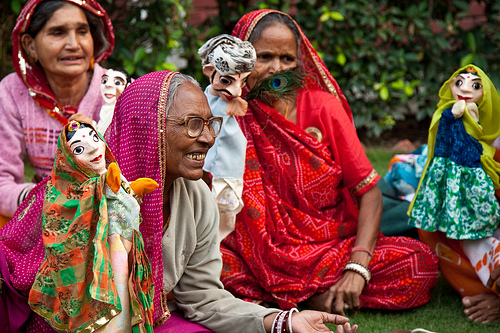Widows use puppetry to find a new path to freedom
Through training provided by a UN Women programme, 16 widows have learnt puppetry and given eight public performances. By making their own puppets and scripting their plays, they have been able to tell their stories and deal with their pain.Date:
New Delhi - 30-year-old Sita recalls the ignominy of being alone and vulnerable. “After my husband passed away in an accident, my in-laws started treating me very badly. When I decided to start work at the local school, they called me a prostitute. They said that I was having an affair because I continued to wear a bindi (decorative mark on forehead),” she says.
Sita was among the 16 widows gathered at the National Forum for Single Women’s Rights held in November 2012 to share their stories. Widowed, divorced or unmarried, each one of them had experienced harassment and exploitation. Some were beaten by in-laws, while others were publicly humiliated.
Breaking with the past through puppetry
Yet what was significant was that the widows were focused on solutions that could empower them, instead of being burdened by a violent past. UN Women, in partnership with Astha Sansthan, taught them puppetry to instill confidence, and help them get back to their normal lives. The puppetry activities were implemented in partnership with Ekal Nari Shakti Sanghathan (Association of Single and Strong Women).
The widows made wood and papier-mâché puppets to express their anguish at the treatment meted out to them. They gave eight performances across Rajasthan, in cities like Bhilwara, Jodhpur, Udaipur, Delhi and Ajmer.

The 16 widows from Ajmer get ready to perform a puppet show. Photo credit: UN Women/Gaganjit Singh
“I really enjoyed doing puppetry. I had done some in school. We highlighted several issues like child marriage, difficulty in getting ration cards, problematic in-laws, old age and land rights during the puppet show. This is a very easy way of showing problems in society,” says 53-year-old Ratan Devi from Ajmer.
For 50-year-old Rajkumari of Ajmer, it was the first time she was doing puppetry. “I liked it very much. I think it was something new that we did.” Rajkumari has performed three times in Rajasthan. Through her puppet, she has spoken about dowry, domestic violence and gram panchayat. “I could not attend the initial training that happened in Tilonia but my friends came back and taught me how to make puppets. I think this is a very great medium and one can add song and dance to it also and present it differently. The show should also be taken to the schools as it focuses on social issues,” she says.

Sorti Bai holding her puppet to tell her story. Photo credit: UN Women/Gaganjit Singh
35-year-old Mamta says:“Before we learnt puppetry we couldn’t express ourselves very well but now we stand behind the curtain and say everything we have to say. We really enjoy doing puppetry and going from one city to another. We feel as if we are doing something special and different,” The discrimination between son and daughter, sarpanchs (village council heads) who do not work and violence against women are some of the themes that have been taken up by Mamta’s team.
Ratan Devi, Mamta and Rajkumari are among the 16 widows from Ajmer who told their story of the abuse using puppets they made and scripts they wrote. These women now exude confidence thanks to a UN Women programme that works with 1,500 widows from India, Nepal and Sri Lanka to help them overcome stigma and access public services.
This training has also provided many with the strength to be part of the mainstream again. “I am confident about doing everything, going anywhere. It is important to be strong,” Sita says with conviction.
Through these performances, many others like her have been able to showcase several issues that they feel need more attention. “At the National Forum, the women expressed their thoughts on domestic violence and the insensitivity of policemen towards victims. Narrating their own stories and developing a script together has helped them not only to leave their pasts behind, but to look towards a brighter, more stable future. And they believe they’re improving with every show,” said Ms Sushma Kapoor, UN Women’s Deputy Representative
Most of all, the experience has been a a small but important step to help them begin their new lives. “The audience enjoyed it and want more performances. When all of us work in a group, we motivate each other,” says Ratan Devi.
Read more about our work with widows:
Articles on our Widows Programme:
Message of Lakshmi Puri, Acting Head of UN Women
Socially Excluded Widows Mobilize for their Rights
Press Release on International Widows Day, 22 June 2013
Widows Still Face High Levels of Harrassment, says Study by UN Women
UN Women announces new programme for Widows in India, Nepal and Sri Lanka
Dimensions of Deprivation: The Widows of Vrindavan
See our Photo Essays about Widows:
Securing Lives of Widows in Vrindavan